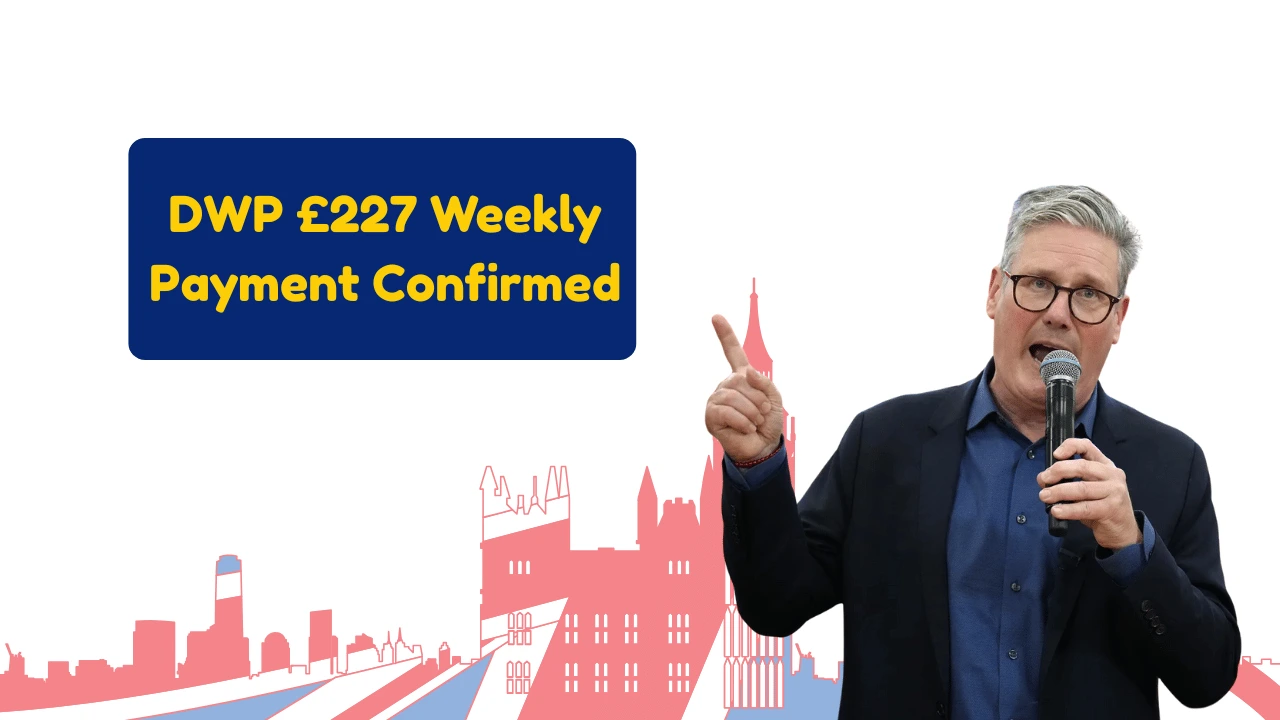In 2025, social media platforms have been flooded with claims about a “new £227 weekly DWP payment” for UK pensioners. However, the Department for Work and Pensions (DWP) has officially confirmed that no such new benefit has been introduced.
The figure of £227.10 per week refers to the Pension Credit guarantee level — a long-standing support scheme ensuring that eligible pensioners receive a minimum income. For couples, the guaranteed amount rises to £346.60 per week.
DWP £227 Weekly Payment
The £227.10 weekly payment represents the minimum income guarantee under the Pension Credit program. This financial top-up is designed to ensure that pensioners do not fall below a basic income level, especially amid rising living costs and inflation pressures.
| Key Fact | Detail |
|---|---|
| £227.10 per week | Minimum income guarantee for single pensioners |
| £346.60 per week | Minimum income guarantee for couples |
| 1.4 million | Current Pension Credit claimants (as of Feb 2025) |
| £207.90 | Average weekly State Pension |
| DWP Clarification | “£227 is the Pension Credit guarantee level, not a new scheme.” |
What is Pension Credit?
Pension Credit is a means-tested benefit aimed at helping low-income pensioners maintain a decent standard of living. It serves as a top-up for those whose weekly income falls below the guaranteed level.
There are two main parts:
1. Guarantee Credit
Ensures income reaches:
- £227.10 per week for single pensioners
- £346.60 per week for couples
2. Savings Credit
Provides an additional payment for pensioners who have modest savings or small private pensions. (Available only to those who reached State Pension age before April 6, 2016.)
Additional Elements
- Extra help for carers, disabled pensioners, and those with housing costs.
DWP £227 Eligibility Criteria
To qualify for the Pension Credit — and therefore the DWP £227 weekly minimum guarantee — certain eligibility rules must be met.
| Eligibility Condition | Requirement |
|---|---|
| Age | Must have reached State Pension age (currently 66) |
| Residency | Must live in England, Scotland, or Wales |
| Income | Must earn below £227.10 (single) or £346.60 (couple) weekly |
| Capital | Savings above £10,000 may reduce entitlement |
| Housing Status | Homeowners and renters are both eligible |
Example:
A single pensioner receiving £190 per week from the State Pension may receive an additional £37.10 per week through Pension Credit to reach the guaranteed level of £227.10.
Benefits Unlocked by Pension Credit
Pension Credit offers more than just income support. It acts as a gateway benefit, unlocking access to a range of other valuable financial aids.
| Linked Benefit | What You Get |
|---|---|
| Free TV Licence (75+) | Annual TV licence worth £169.50 |
| Cold Weather Payment | £25 per week during extreme cold |
| Winter Fuel Payment | Annual heating aid between £100–£300 |
| Free NHS Dental Treatment | Covers all NHS dental costs |
| Council Tax Reduction | Reduces local council tax bills |
| Help with Housing Costs | Possible rent or mortgage assistance |
🟢 Note: Claiming Pension Credit can unlock over £3,000 in additional yearly benefits.
Payment Details and Schedule
DWP issues Pension Credit payments every four weeks, directly to the claimant’s bank or building society account. Payments are tax-free and ongoing once approved.
| Aspect | Details |
|---|---|
| Payment Frequency | Every 4 weeks |
| Start Date | From the date of successful application |
| Delivery Method | Direct to bank or building society |
| Payment Reference | “DWP PENSION CREDIT” on statements |
| Review | Adjusted annually in line with inflation |
There are no current changes to the 2025 payment timetable — pensioners already receiving the benefit will continue on the same schedule.
Why the Confusion in 2025?
A series of misleading viral posts on social media led many to believe that DWP had launched a new £227 weekly pension payment. In reality, this figure represents the existing Pension Credit top-up, not a new allowance.
“People often misinterpret DWP updates as new schemes,”
explains Dr. Emma Clifford, Social Policy Analyst.
“The £227 amount simply reflects the updated guarantee level of Pension Credit — a system that’s been in place for years.”
Recent Updates (2025)
- February 2025: DWP reaffirmed the £227.10 single-person and £346.60 couple guarantee levels.
- April 2025: Rates expected to be reviewed under the annual inflation uprating.
- June 2025: DWP to launch a new awareness campaign to increase Pension Credit applications.
Currently, over 850,000 eligible pensioners are still not claiming Pension Credit — missing out on an average of £3,900 per year in unclaimed benefits.
Why Pension Credit Matters
Pension Credit remains one of the UK’s most effective programs for reducing pensioner poverty.
Economist Dr. Michael Warren emphasizes:
“The £227 figure is more than a number — it represents financial dignity for older citizens. Sadly, thousands miss out simply because they don’t know they’re eligible.”
For many, Pension Credit makes the difference between being able to heat their homes, buy medication, or afford nutritious food.
FAQs
Q1. Is the £227 payment a new DWP benefit?
No. It refers to the minimum income guarantee under Pension Credit, not a new benefit.
Q2. Who qualifies for the DWP £227 per week?
Single pensioners earning below £227.10 per week, and couples earning below £346.60 per week.
Q3. Is it paid automatically?
No. Pension Credit is not automatic — you must apply through DWP.
Q4. Can State Pension recipients still qualify?
Yes. Many pensioners receiving the State Pension still qualify for Pension Credit.
Q5. When are payments made?
Every four weeks, directly into your bank or building society account.
Q6. What extra benefits can it unlock?
It can provide access to free TV licences, Winter Fuel Payments, dental care, and Council Tax reductions.
Final Word
The DWP £227 weekly payment isn’t a new benefit — it’s part of the Pension Credit safety net that ensures older people maintain financial stability and independence.
If you or someone you know is over State Pension age, it’s worth checking eligibility — because a simple claim could unlock thousands of pounds in extra support every year.













